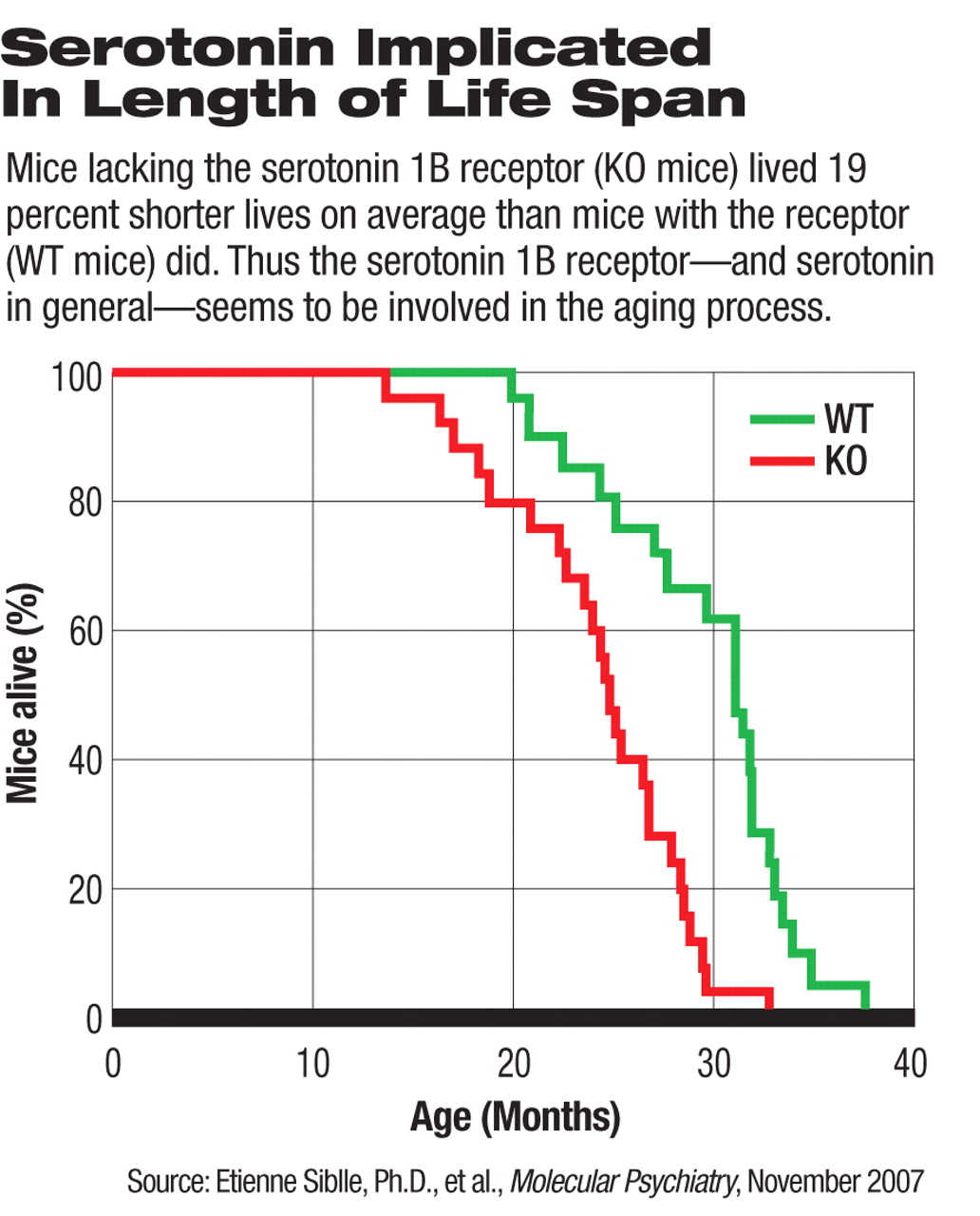Researchers now believe that they have a handle on some of the biology underlying the aging process.
For example, the older a person is, the fewer times his or her cells divide when cultured in the lab. The reason is because the telomeres (DNA-protein complexes) capping the ends of a cell's chromosomes shorten a bit during each cell division. Finally the telomeres become so short that the cell cannot divide any more and dies.
Furthermore, while the e4 variant of the APOE gene is known to be a risk factor for Alzheimer's, centenarians often carry the e2 variant of this gene, suggesting that the APOE e2 gene is a longevity gene.
Also, a decrease in serotonin receptors of the 2A variety has been noted in the aged human brain. And now serotonin receptors of the 1B variety have been implicated in the aging process as well.
Etienne Sibille, Ph.D., an assistant professor of psychiatry at the University of Pittsburgh, and colleagues followed 24 mice that lacked the gene for the 1B receptor and 21 genetically unaltered mice from birth until death. The mice that lacked the receptor died on average 19 percent earlier than the other mice did. This was a highly significant difference statistically.
Thus, it looks as if serotonin receptors are involved in normal aging, Sibille and her group concluded in their study report, which appeared in the November Molecular Psychiatry.
But do the results obtained in mice also apply to humans?“ Potentially yes,” Sibille told Psychiatric News.“ We are testing this now.”
Since they found that an absence of the serotonin 1B receptor hastens aging, Sibille speculated that variants in the serotonin 1B receptor gene may influence the pace of aging. “We are testing this now,” she said
Serotonin, of course, has been deeply implicated in mental health. For instance, the serotonin 1A receptors, the serotonin 1B receptors, and the serotonin transporter have been linked with anxiety, depression, suicide, and alcoholism. The SSRI antidepressants block the serotonin transporter. So if serotonin plays such a central role in mental health, it raises the question of whether its role in mental health meshes with its role in longevitiy.
One possibility, Sibille and her colleagues proposed in their report, is that “as the serotonin system is the target of chronic pharmacological interventions for psychiatric. .diseases, these results raise the possibility of long-term and/or age-related consequences to serotonin manipulation....”
Regardless of whether SSRI antidepressant use has any impact on aging, the interplay between serotonin's influence on mental health and its influence on aging is likely to be complex, Sibille anticipates.
Some other researchers are also unmasking the interface between serotonin's impact on mental health and its impact on aging. For instance, Naomi Simon, M.D., associate director of the Center for Anxiety and Traumatic Stress Disorders at Massachusetts General Hospital, and coworkers found that persons with mood disorders have shorter telomeres than do healthy control subjects (Psychiatric News, June 1, 2006).
The study was funded by the National Institute of Mental Health.
An abstract of “Lack of Serotonin 1B Receptor Expression Leads to Age-Related Motor Dysfunction, Early Onset of Brain Molecular Aging, and Reduced Longevity” is posted at<www.nature.com/mp/journal/v12/n11/abs/4001990a.html>.▪

